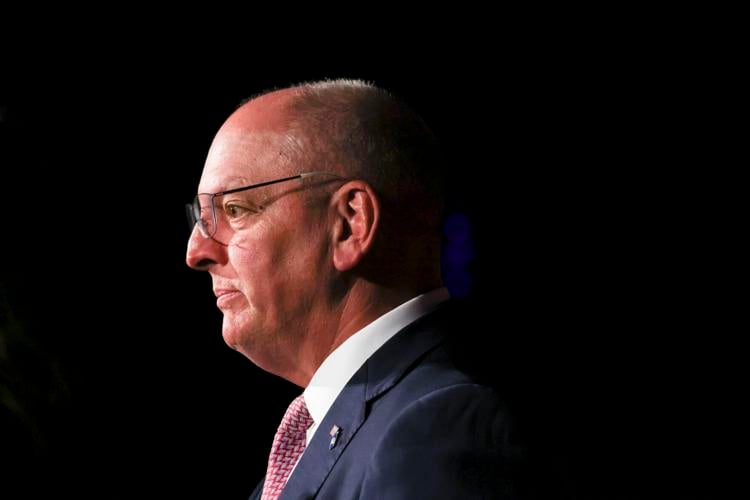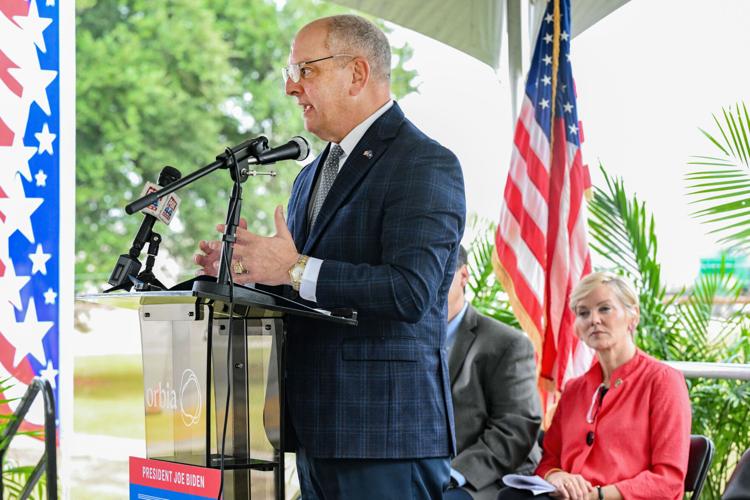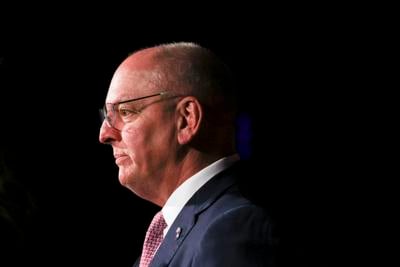John Bel Edwards owes his status as the Deep South’s only Democratic governor at least in part to his deeply held conviction that abortion is wrong.
In 2015 and four years later, when Edwards ran for reelection, that stance was a major draw for anti-abortion voters across the political spectrum in a state where opposition to the procedure has long been the norm. Edwards’ abortion beliefs, coupled with his pro-gun stance and law enforcement background, gave him the right mix of conservative bona fides needed to win in a state increasingly dominated by Republicans. But his abortion views had few concrete policy implications for the first six-plus years of his term.
That changed overnight in June of 2022 when the Supreme Court revoked a half-century of abortion rights by striking down Roe v. Wade.
Suddenly, Edwards and other governors across the country became the mechanisms by which states codified “trigger laws,” statutes drafted preemptively to ban abortion from the moment of the high court’s ruling. When that moment came, Edwards had already delivered for anti-abortion interests. The ban he had signed in March of 2022 is one of the strictest in the country with no exceptions for victims of rape and incest.
“It was always an academic discussion until the Supreme Court acted,” said Edwards, who leaves office in January, in a recent wide-ranging interview reflecting on his term. “Now it’s real.”

Governor John Bel Edwards at Koura's St. Gabriel plant on Friday, November 17, 2023.
Under that new reality, Edwards’ abortion record exemplifies a rift cleaving through Louisiana politics. Most Louisiana Democrats cheer his accomplishments on priorities like Medicaid expansion, which brought healthcare to thousands of poor Louisianans. But for progressives who think the party should embrace what they see as grassroots priorities of expanding abortion and protecting transgender rights, Edwards’ pivotal role in banning abortion sours those achievements.
For some, it came as a betrayal.
“We knew he was anti-choice overall, but we thought he would be a little softer,” said state Rep. Mandie Landry, D-New Orleans, a vocally pro-abortion rights lawmaker. “I think people were very misled. He needed us to help him. We all got involved.”
Since Roe was overturned, Edwards has lobbied lawmakers to retroactively add rape and incest exceptions to the ban.

Anti-abortion demonstrators, center left, argue with abortion-rights activists outside the Supreme Court in Washington in 2022.
Edwards, a devout Catholic who often says that being “pro-life” means more than just banning abortion, expressed contrition that the exceptions did not become law in his final term. But he has “no regrets” about signing the bill that omitted those exceptions in the first place, he said.
He believes he did not receive enough credit for the fact that the bill he signed expanded on exceptions included in the original trigger law, which the Legislature passed in 2006. The new bill preserved exceptions from the 2006 law for cases that threaten the life and health of the mother, he said, while adding exceptions for non-viable fetuses.
“There are way too many people in Louisiana in the media who never bothered to get that right,” Edwards said.
A decisive legacy on abortion law
As he prepares to cede the Governor’s Mansion to Republican state attorney general Jeff Landry, Edwards’ record is earning him plaudits from anti-abortion conservatives and Democrats alike.
Kristen Day, executive director of anti-abortion group Democrats for Life of America, penned a guest column in the Times-Picayune last week thanking Edwards for his leadership. Day called Edwards "a beacon of hope" and a "unifying force" for the anti-abortion movement in the Deep South. She urged other national Democrats — most of whom view abortion rights as a non-negotiable party priority — to emulate Edwards’ views.

Alex Seghers, left, director of education, and Ashley Gilliam, youth programs director, discuss upcoming events at their Louisiana Right to Life office in New Orleans on Friday, June 23, 2023. (Photo by Chris Granger | The Times-Picayune | NOLA.com)
Ben Clapper, director of the powerful anti-abortion lobby Louisiana Right to Life, believes Edwards’ election chances would have been zero were it not for his views on the procedure.
Edwards delivered on his promises to the anti-abortion movement beginning in the earliest days of his term, Clapper said. Clapper pointed to his backing for foster care and crisis pregnancy centers, which offer pregnancy tests, ultrasounds, counseling and other services for women facing unplanned pregnancies and which typically oppose abortion.
“What I think will be his legacy is his signing at least 40 pieces of pro-life legislation into law of all sorts and stripes and types over these eight years,” Clapper said, noting that Edwards had never vetoed a bill his group supported. “Of course, signing the 2022 Human Life Protection Act...history will remember that as the most significant bill of those 40. But even back in 2016, there were important pieces of legislation that he signed.”
Abortion-rights advocates agree on the pivotal nature of Edwards’ influence on their cause.
“There are ways that I think his administration made some really meaningful changes to Louisiana, including accepting the Medicaid expansion and standing up in the face of attacks on trans young people,” said Michelle Erenberg, director of the pro-abortion rights group Lift Louisiana. “But his record on abortion is pretty disappointing. I don’t think any of us were under any illusion about what his personal position on abortion was coming into the governorship. Yet even in the face of a big showing of public support for abortion access in Louisiana...he continued to sign and to not push back against any of the abortion restrictions that came across his desk.”
Looking ahead
Edwards said he has heard few complaints from doctors about the state’s abortion law since the early months after Roe was overturned — despite several physicians who testified at the state Legislature earlier this year that they work in fear of violating what they described as ambiguities in the way the ban’s exceptions are written.
Edwards is optimistic that Republican lawmakers will enact rape and incest exceptions in Louisiana and elsewhere in the coming years.

Health care assistant Sharah M. right, works on a patient file, Friday June 23, 2023, Planned Parenthood health center located at 3825 Government Street in Baton Rouge.
“The pro-life movement, Republicans in particular, comes across as too extreme on that issue,” he said. “It’s something supported by huge majorities of Americans and Louisianans.”
Polling performed by this newspaper and several nonpartisan partners earlier this year shows Edwards is right about the shifting views of Louisiana voters. About half of the state’s voters now believe the ban on abortion should be loosened to provide more access, that polling showed. That’s in contrast to 2016, when most voters wanted most abortions banned, according to an LSU poll.
Harnessing the political will in the halls of the State Capitol to make that happen will be another matter.
Republican lawmakers feared having to publicly debate around rape and incest exceptions during this year’s legislative session. Bills supported by Edwards to carve out those exceptions and to clarify existing exceptions concerning non-viable pregnancies were killed swiftly in Republican-controlled legislative committees. And in the fall election cycle, some GOP political strategists advised candidates against discussing the issue.
People on both sides of the debate say there are few signs that will change any time soon.
“The anti-abortion extreme advocacy movement in Louisiana has made it very clear that they do not support those exceptions, and they continue to have an outsized influence on opinions of Republicans and other conservative lawmakers in the Legislature,” Erenberg said.
The new Republican-supermajority Legislature is as “pro-life” as any recent crop of lawmakers, said Clapper, whose group opposed rape and incest exceptions in the last legislative session.
“I would say this is a pretty strongly pro-life group of legislators who are coming in who are very committed to the state’s pro-life position,” he said.






